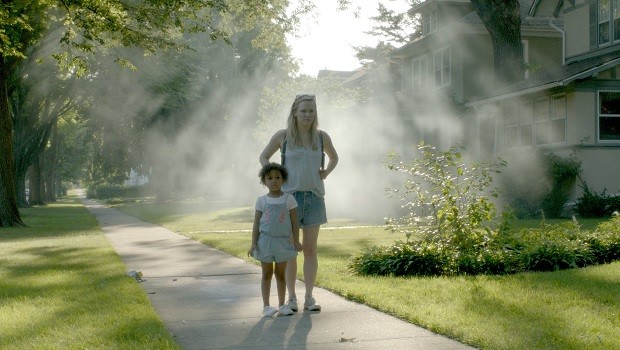Saint Frances is the kind of indie that rarely makes theatrical ground here nowadays: practically no recognisable names in the credits nor familiar faces on screen, a film that foregrounds ordinary people and the erratic rhythms of everyday American lives, which quietly, gradually - with no means greater than smart, empathetic storytelling - creeps up and begins to work its charm on you. It's come out of nowhere, and it has its sights set (I warn you now) on your heart and your cockles. At its centre is Bridget (screenwriter Kelly O'Sullivan), who as we find her is 34, single, working as a waitress, and being further depressed by a man at a party. She's not beyond all hope, though the way the film is set out speaks to a scattered focus that explains how she is where she is. She leaves that party with a younger guy (Max Lipchitz), a brighter prospect who isn't weirded out when her period arrives in the middle of the night. She lands a summer job as a nanny to the eponymous Frances (Ramona Edith Williams), precocious preschooler daughter of a same-sex, mixed-race couple with a Black Lives Matter placard on their front lawn. She gets pregnant, and undergoes an abortion. She falls for Frances's worldly music teacher (the versatile Jim True-Frost, best known as The Wire's unworldly Pryzbylewski) and buys herself a guitar. A sense is soon conveyed of a no-longer-so-young woman working through all of the options you're meant to shut down at some stage in early adulthood - and doing so in a matter of weeks, while she's still bleeding out from her procedure. That's how life sometimes is: one damn thing after another. It never stops, until it does.
What emerges from this whirlwind is another portrait of a messy woman, albeit one who really does feel organically messy, a lived-in, flesh-and-blood creation rather than an academic or commercial construct. (If you don't believe me, follow the crimson trails that mark out her toing-and-froing.) If Saint Frances plants a toe or two in newish territory, it's because O'Sullivan and director Alex Thompson care to show us the cause(s) of this messiness - Bridget's tendency to take too much on, to follow every last one of her own whims - as well as their comic effects. Our girl is good with the kid - she genuinely cares about Frances, as we do, given Williams' very sweet, well-coached performance - but she's also prone to distraction, sending firefighting texts to her lovers while her charge is stumbling around the fringes of a lake, or picking a fight during a family picnic, neither of which you'd really want in a nanny. That perhaps makes the film sound edgier than it is. Set against something like 2011's Young Adult - a rare example of a studio giving full backing to a script by a genuinely idiosyncratic voice - Saint Frances is consistently cuddly, with stretches that could seem cosily conservative. If there was an Oscar for Nicest Picture, it would win at a canter. Yet it's neither cotton-headed nor sappy, which is something. O'Sullivan sets so much up (or leaves so much trailing behind Bridget) in the first half that there's a lot to sort and work through in the home straight, as it becomes clear our heroine has emerged into a community of messy women; that there may be a continuum of messiness out there, extending to her married employers and the young girl who trashes her playroom when she can't get what she wants. It's peddling nothing more radical or revolutionary than reassurance, ultimately: the message is you are not alone, and you should be free to pass through your phases in your own damn time. Yet at a time when we're more distant than ever, there will likely be those who cling to a hug of a movie such as this.
Saint Frances opens today in selected cinemas.

No comments:
Post a Comment